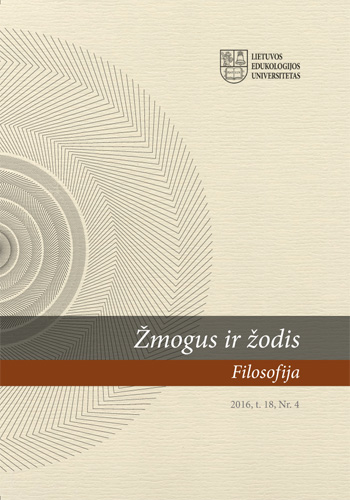Tarp apšviestosios sąžiningos sąmonės ir saviapgaulės: Hegelio ir J.-P. Sartre’o jungtys
Between enlightened conscience and self-deception: links between Hegel and Sartre
Author(s): Gintautas MažeikisSubject(s): Political Philosophy, 19th Century Philosophy, Contemporary Philosophy, German Idealism, Existentialism, Phenomenology, Ontology
Published by: Vytauto Didžiojo Universitetas
Keywords: conscientious reason; unhappy reason; objectivation; enlightenment; bad faith or self-deception; existence; non-foundationalism;
Summary/Abstract: Criticism of the ideals of enlightenment is developed in the article by emphasising the limits of the enlightened conscientious reason, objective self-deception and importance of non-foundationalism for existential self-determination. Objectivation, principality and conscientious consistency are often deviations caused by enlightenment. These deviations influence contemporary political and institutional solutions and social regulation. The article is written in the polemic spirit with a lot of reference to the contemporary processes and analyses: a) considerations of ideas of G. Hegel about the enlightened conscientious and unhappy reason, as well as about the limits of objectivation and servitude to abstract principles - these ideas are expanded in his Phenomenology of the Spirit; b) discussion of Sartre about objective bad faith or self-deception and the phenomenon of being-together-with-others as presented in his works Being and Nothingness and Existentialism is Humanism; c) discussion about the importance of non-foundationalism for existential self-determination. The idea of self-deception is interpreted in the context of Nothingness, dialectical negation, making new faces and assuming new social roles. The article represents an active, socially integrated and enabled man, who together with others continuously overpasses the restraints of objectivism and principality, as well as opens possibilities for dialogue of alternatives, their diplomacy and politicality. The aim of the article is to actualise criticism of the conscientious reason, enlightened self-deception and bad faith. The conclusions are applied in the analysis of contemporary public objective attitudes and for solutions of social-constructivism.
Journal: Žmogus ir žodis
- Issue Year: 18/2016
- Issue No: 4
- Page Range: 84-105
- Page Count: 22
- Language: Lithuanian

